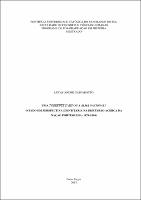| Share record |


|
Please use this identifier to cite or link to this item:
https://tede2.pucrs.br/tede2/handle/tede/2519| Document type: | Dissertação |
| Title: | Uma Torrente d ais ou A alma nacional? : o fado em perspectiva identitária na discussão acerca da nação portuguesa : (1878-1904) |
| Author: | Gasparotto, Lucas André  |
| Advisor: | Paredes, Marçal de Menezes |
| Abstract (native): | O fado, gênero musical considerado canção nacional em Portugal, surge na periferia da cidade de Lisboa na década de 1840. A partir dos anos 1860, já é possível observá-lo circulando entre as diversas camadas da sociedade portuguesa. Este trabalho investiga duas imagens do fado compostas entre a segunda metade do século XIX e os primeiros anos do século XX, a fim de desemaranhar a tessitura que tramou tais retratos através do tempo. Busca-se, assim, demonstrar a historicidade na construção dos símbolos nacionais, bem como o caráter mutável do conceito de nação, através da apreensão dessas imagens do fado construídas em dois momentos da história de Portugal: ora como elemento incapaz de figurar como símbolo da nação portuguesa, ora como objeto cultural genuinamente português. Constituídas no contexto em que se percebe a alteração da perspectiva temporal de análise da história de Portugal, quando a intelectualidade portuguesa rompe com uma tradição passadista na concepção da nação e descortina a possiblidade de repensá-la segundo pressupostos com condições de consolidação no futuro, as imagens do fado em questão, defende-se, estiveram ligadas às estéticas de recomposição identitária desenvolvidas pela cultura portuguesa. Através da articulação das temporalidades expressas pelas categorias de espaço de experiência e horizonte de expetativa, aponta-se, assim, a elaboração das referidas estéticas por duas lógicas de pensamento vinculadas às ideias em torno de dois agrupamentos de intelectuais. A primeira, demarcada pela chamada Geração de 1870, de cunho cientificista ligado à corrente literária realista e a um modelo racional de nação de inspiração classicista-humanista, encontra síntese nas obras de Eça de Queirós, O Primo Basílio (1878) e A Ilustre Casa de Ramires (1900), nas quais o fado é desconsiderado como símbolo nacional. A segunda lógica de pensamento, atribuída à dita Geração de 1890, cujas ideias caracterizam-se por um viés nacionalista relacionado ao contexto pós-Ultimatum de 1890, ligada à corrente literária simbolista e a um modelo etnocultural de nação de inspiração romântica, estão presentes nas obras dos olisipógrafos Pinto de Carvalho, História do Fado (1903), e Alberto Pimentel, A Triste Canção do Sul (1904), nas quais o fado figura como expressão da alma nacional. |
| Abstract (english): | A musical style that is considered the national song in Portugal, the Fado arose in Lisbon suburb in 1840. From the 1860 s, it is possible to observe it circulating between the various strata of the Portuguese society. This paper investigates two images of the Fado made between the second half of the nineteenth century and the early years of the twentieth century, in order to unravel the fabric that plotted such pictures through time. The aim is, thus, to demonstrate the historicity in the construction of national symbols and the changing character of the concept of nation, by seizing these "images" of the Fado built in two moments in Portugal s History: sometimes as an element unable to appear as symbol of the Portuguese nation, sometimes as a genuinely Portuguese cultural object. Established in the context in which one perceives the change in time frame analysis of Portugal's history, when the Portuguese intelligentsia breaks with a past tradition in the nation's design and opens up the possibility of rethinking it based on the assumptions with conditions of consolidation in the future, the "images" of the Fado in question, it is argued, were linked to the "aesthetic of identity recomposition" developed by the Portuguese culture. Through the articulation of temporality expressed by the categories of "space experience" and "horizon of expectation", it is noted, as well, the establishment of these "aesthetic" by two logical thoughts linked to ideas around two intellectual groups. The first, marked by so-called Geração de 1870, of scientistic slant on the realistic literary trend and the rational model of nation of enlightenment inspiration, is summarized in the works of Eca de Queiroz, O Primo Basilio (1878) and A Ilustre Casa de Ramires (1900), in which Fado is disregarded as a national symbol. The second logical thought, attributed to the alleged Geração de 1890, whose ideas are characterized by a nationalist bias related to post-Ultimatum context of 1890, connected to the symbolist literary trend and an ethnocultural model nation of romantic inspiration, are present in the works of olisipography (study of Lisbon) by Pinto de Carvalho, História do Fado (1903), and Alberto Pimentel, A Triste Canção do Sul (1904), in which the Fado figures as an expression of "national soul". |
| Keywords: | MÚSICA POPULAR - PORTUGAL FADO NAÇÃO IDENTIDADE NACIONAL HISTÓRIA - PORTUGAL |
| CNPQ Knowledge Areas: | CNPQ::CIENCIAS HUMANAS::HISTORIA |
| Language: | por |
| Country: | BR |
| Publisher: | Pontifícia Universidade Católica do Rio Grande do Sul |
| Institution Acronym: | PUCRS |
| Department: | Faculdade de Filosofia e Ciências Humanas |
| Program: | Programa de Pós-Graduação em História |
| Citation: | GASPAROTTO, Lucas André. Uma Torrente d ais ou A alma nacional? : o fado em perspectiva identitária na discussão acerca da nação portuguesa : (1878-1904). 2015. 145 f. Dissertação (Mestrado em História) - Pontifícia Universidade Católica do Rio Grande do Sul, Porto Alegre, 2015. |
| Access type: | Acesso Aberto |
| URI: | http://tede2.pucrs.br/tede2/handle/tede/2519 |
| Issue Date: | 4-Mar-2015 |
| Appears in Collections: | Programa de Pós-Graduação em História |
Files in This Item:
| File | Description | Size | Format | |
|---|---|---|---|---|
| 466746.pdf | Texto Completo | 1.19 MB | Adobe PDF |  Download/Open Preview |
Items in DSpace are protected by copyright, with all rights reserved, unless otherwise indicated.




